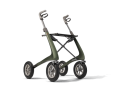For those who struggle with translation thingamigiggies here is the Googlish.
“
It seems proven that very reflective people or people with high intellectual abilities tend to experience more existential crises than the rest of us; but it is not exclusive to people with these characteristics.
All people can experience an existential crisis at some point in their lives.
We should not think that existential crises are minor things, since deep emotional anguish, having negative thoughts about life, the future, and the meaning of existence itself can sometimes lead to depression if not faced correctly.
The common characteristics of depressive disorders is the presence of a sad, empty or irritable mood, accompanied by somatic and cognitive changes that significantly affect the person's normal functioning.
And within depressive disorders we can find different types, the best known to everyone is perhaps major depressive disorder, but there are others such as disruptive mood dysregulation disorder or persistent depressive disorder commonly called "dysthymia."
But we are not going to talk about depressive disorders, but about the importance of managing existential crises so that they do not lead to depression and are a reason for positive self-discovery. As? Well, doing the
Camino de Santiago. But doing it without pre-established commitments, doing it on your own, doing it as learning and with an attitude of openness to experience.
First of all, to face an existential crisis, you must give yourself permission to feel that sadness, anxiety, confusion or that feeling of emptiness or any other emotion or sensation that accompanies you.
All emotions have their function. Sometimes, we have the tendency to try to radically eliminate from ourselves everything that we dislike, and that, dear pilgrims, is not possible. We are human beings and we suffer.
Let's keep in mind that the basic emotions are joy, sadness, fear, surprise, anger and disgust. Except for joy and sometimes surprise... we don't like the rest so much. But some are as necessary as others. And if we try to get rid of them, the only thing we are going to achieve is that they appear in another way or manifest themselves in another part of the body, causing us harm.
When you are happy, you laugh or smile. And when you are sad, you cry.
Sharing the feelings of the existential crisis with trusted people helps a lot. And if it is on the
Camino de Santiago with pilgrims willing to listen, it helps more.
Sharing helps us to draw from within, to put distance; and, furthermore, it helps us feel a little better. If these sensations are shared with pilgrims willing to listen to us, perhaps we will begin to find some meaning in life: sharing.
We are social beings (some more than others) and sharing our things makes us more human, brings us closer to who we are.
If we have an existential crisis and we choose the
Camino de Santiago as an ideal context to find a Camino in life, perhaps it can help us.
Day by day, step by step, alone or in company, perhaps we are realizing that
the meaning of life is to walk, without further ado. Oops, did I say this?
When we have been walking for several days we usually enter a different psychological dimension, a frequency of improvement and well-being that makes us see our problems from a certain distance. We learn to value the pleasure of a shower, a meal or a restful rest in a hostel bunk after a hard stage.
Our daily problems become others: basic needs (eating, drinking and sleeping; and of course: walking).
With this we achieve greater psychological flexibility, we realize that those thoughts linked to our existential crisis that we had running through our heads daily, now have a lighter dimension. Because now what we need is to know that we have access to food to feed ourselves or shelter to rest.
If we also hurt ourselves, get a blister, start to get tendinitis or something similar, surely our attention will go to the pain and we will forget about the other ruminative thoughts that continually asked us what the meaning of our life was.
We will still not know what the meaning of our life is, but we will have a blister that will be warning us that the meaning of life in those moments lies in our feet and in the way we can continue walking without pain.
Let's not forget spirituality. There are atheist people who have existential crises and there are spiritual people who have existential crises. The
Camino de Santiago is a perfect context to connect with that spirituality and find answers to our most philosophical questions.
Pilgrims admiring the sunset in Fondebadón (French Way).
You can be an atheist and also have mystical experiences. I tell you. Mystical experiences are directly related to brain neurobiology, it is not necessary to believe in any god or something similar.
Whether you are a believer or an atheist, walking day after day in solitude along some
Camino de Santiago with an attitude open to discovering about yourself and the environment, disconnecting as much as possible from the digital context and the news of the world, it can help you have a mystical experience. that invites you to perceive life in another way; thus helping you face the existential crisis from a different perspective.
Neuroscience continues to investigate transcendental experiences and it has been seen in the laboratory that, by stimulating some areas of the brain, mystical experiences can be achieved. That's why we know that they are not related to beliefs, but to brain neurobiology. In any case, there is much left to find out about it. And I am not going to comment on the real function of mystical experiences, because I do not know if they have a function in themselves or not. What is certain is that we can take advantage of them for self-knowledge if we are open to learning.
The connection with nature that we have on the
Camino de Santiago, the connection with other people, or the number of symbols that we can find, are three other factors that help us manage an existential crisis.
We have already talked on multiple occasions about walking through natural environments:
- reduces the activity of the amygdala (the brain structure closely related to fear and anxiety).
- Cortisol (the stress hormone) levels are optimized.
- Being in contact with natural morning light outdoors, we promote correct levels of vitamin D and serotonin (the neurotransmitter of happiness).
- dopamine is the neurotransmitter of pleasure and movement (among other things); walking is movement; and walking, what they say walking, we walk a lot.
- Have I ever described to you what phytoncides do to us? Don't accuse me of using weirder words every day! Phytoncides are chemicals released by plants, and some research suggests that exposure to phytoncides can reduce stress and improve mood. On the Camino de Santiago we go through rural environments many times: full doses of phytoncides daily.
So, even if we focus only on biology, we already have reasons to realize that walking day after day in a safe context such as the
Camino de Santiago, helps us feel better and shed light on our existence.
If we are also spiritual or mystical, we have that plus.
And if we also believe in the
Camino de Santiago as an ideal context to be happier... you know: if you are going through an existential crisis, go and grab your backpack now!
Good way.
“

 www.gronze.com
www.gronze.com




















